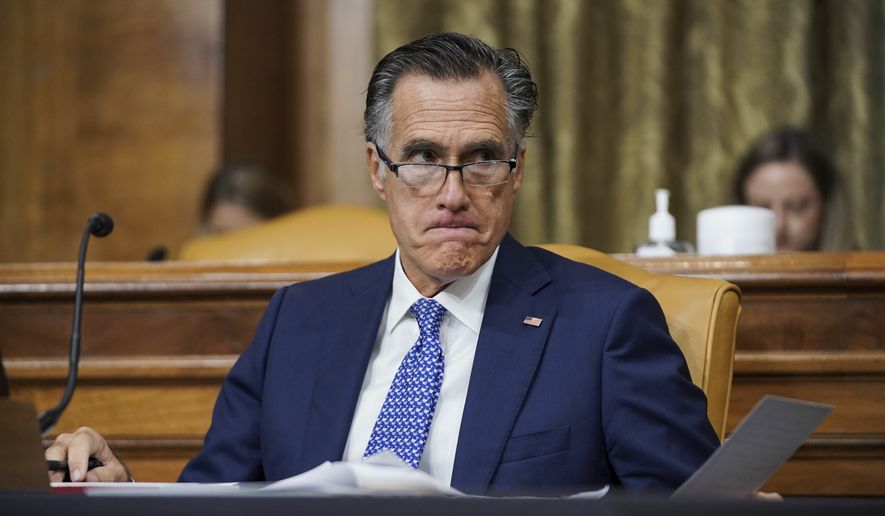GOP lawmakers are beginning to fret that a bipartisan group of senators attempting to resuscitate infrastructure talks is giving a facade of bipartisanship to President Biden’s plan to force through massive spending and tax hikes with only Democratic votes.
Senate Republicans told The Washington Times that they fear the White House will subvert the intentions of the bipartisan group — which includes Sen. Mitt Romney of Utah and other more moderate Republicans — to falsely claim broad support for their roughly $2 trillion spending plan.
“The White House doesn’t seem to want a real deal, they weren’t willing to work with the Senate Republican leadership on something everyone can get behind,” said one GOP lawmaker who requested anonymity when discussing actions of fellow Republicans. “The majority leader is talking about going it alone regardless, so why give them a win?”
The fears surfaced after Mr. Biden announced an end to more than a month of infrastructure negotiations led by Sen. Shelley Moore Capito, West Virginia Republican. The talks fell apart over an unwillingness by Republicans to compromise on raising taxes and Mr. Biden’s insistence on including social welfare and climate change spending in the package.
After the breakdown, a bipartisan group of lawmakers has jumped into the fray hoping to forge a consensus on their own. The group, which has no ties to congressional leadership, counts among its members both moderate Democrats and Republicans.
“We began working weeks ago and we’ve got Republicans and Democrats that agree, pretty much down to dollars and cents,” Mr. Romney said.
Most of Mr. Romney’s colleagues take a dim view of the effort. Mr. Biden’s team, they warn, could strike a watered-down compromise on infrastructure just to be able to say they achieved a bipartisan deal. Mr. Biden could then get the rest of what he wants passed via budget reconciliation, a process that allows spending bills to pass the Senate with a simple majority of 51 votes.
The upshot: Mr. Biden, who campaigned on a pledge to restore bipartisanship in Washington, claims credit for staying true to his promise while simultaneously delivering a liberal wishlist of spending for his party’s progressive base.
Senate Majority Leader Charles E. Schumer, New York Democrat, hinted at the strategy by promising to begin the reconciliation process regardless of how bipartisan talks go.
“I don’t know why any Republican would want to help Democrats further mortgage our children’s future in that manner,” said Sen. Ron Johnson, a Wisconsin Republican who is openly skeptical of the dealmaking now underway.
Such concerns are one of the reasons why it is unclear if the new negotiations will draw enough Republican support to overcome a likely filibuster in the Senate, which is split 50-50 between the parties.
The membership of the bipartisan group is fluid but several Senate Republicans are involved. The effort is being led on the Republican side by Mr. Romney and Sen. Rob Portman of Ohio and on the Democratic side by Sen. Joe Manchin III of West Virginia and Sen. Kyrsten Sinema of Arizona.
Mr. Romney and Mr. Portman are convinced they have more leverage than Democrats want to admit.
A Republican source close to the negotiations noted that Democrats are not assured they can pass the package through the reconciliation process, which would require support from all 50 Democratic senators. And the rest of Mr. Biden’s plan is tax hikes that will be difficult to get through the House and Senate.
Notably absent from the group are the moderate Republicans who are most likely to support a deal such as Sens. Pat Toomey of Pennsylvania and Thom Tillis of North Carolina. Mr. Toomey, in particular, is seen as a key swing vote and is not seeking reelection in 2022.
Mr. Romney admitted that rounding up additional support from other Republican senators was required before moving forward.
“We’ve met with a number of additional members of the Republican group and talked through the various line items,” he said. “We’re in a good place and we’ll see whether there’s support from a sufficient number of Republicans to make this interesting to the White House and Democrats.”
Complicating matters is that many believe if Ms. Capito and members of GOP leadership were unable to cut a deal with the White House, the new bipartisan group is unlikely to do better from the Republican standpoint.
The White House initially proposed spending about $2.25 trillion on infrastructure, with most of the money earmarked for social welfare and combating climate change. Republicans balked at the sum, arguing that any infrastructure package should focus exclusively on repairing the nation’s roads and bridges.
Eventually, Mr. Biden trimmed his request down to $1.7 trillion, but both sides remained far apart on how to pay for the spending.
The White House wanted to pay for the package by raising business and income taxes or at the very least imposing a 15% minimum tax on corporations. Republicans opposed tax increases, arguing in favor of repurposing unused coronavirus relief funds.
Mr. Romney’s group is eyeing a spending package closer to the Republican final offer than to Mr. Biden’s. Although not yet finalized, the bipartisan senators propose spending upwards of $900 billion exclusively on transportation systems.
They also hope to accomplish the deal without hiking corporate or income taxes. It is uncertain, though, if the White House will accept that position. Mr. Biden opted to walk away from the negotiations led by Ms. Capito over the GOP’s unwillingness to support any tax increases.
“There is bipartisan support for needed investment in our nation’s infrastructure. Unfortunately, there is also bipartisan support for spending money we don’t have,” Mr. Johnson said. “A responsible infrastructure bill would repurpose the $700 billion … in spending from the Democrats’ $1.9 trillion COVID relief bill.”
• Haris Alic can be reached at halic@washingtontimes.com.




Please read our comment policy before commenting.